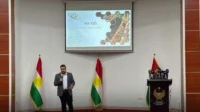Reducing need for generators
Solar power implemented in Mergasor district villages
MERGASOR — A solar power initiative is being implemented in several villages within the Mergasor district, offering a sustainable energy solution to areas without generator-based electricity.
The system, leveraging advanced technology, converts sunlight into electricity through specialized equipment known as photovoltaic (PV) panels. This process is highly efficient and environmentally friendly, as it emits no pollutants and reduces the dependence on fossil fuels. The utilization of solar power is particularly significant in the context of the Mergasor district, where access to sustainable energy alternatives can profoundly impact the quality of life and environmental health.
The adoption of solar power not only provides a renewable source of energy but also offers notable environmental benefits. By harnessing the sun’s energy, the system mitigates the community’s reliance on generators that burn fossil fuels. These conventional generators are notorious for releasing harmful emissions into the atmosphere, contributing to air pollution and climate change. Furthermore, the noise and the potential for soil and water contamination from fuel spills pose additional environmental and health risks to the local communities.
Ardawan Ibrahim, General Director of Soran Electricity, informed 964media that the solar power initiative has been successfully installed in various villages around the Mergasor district. “It is being implemented in villages that do not have generator-based electricity,” he stated.
So far, the solar power has been activated in the villages of Bnder and Enemsid, located within the Piran sub-district of Mergasor.
Each household within the project’s scope receives approximately six amperes of electricity, capable of supporting the national grid electricity at different times.
Ibrahim explained that extending this system to all villages within the Soran administration boundary is currently not feasible due to significant cost implications.
The Soran administration has allocated funding for the solar power project, with a minimal contribution also collected from the residents of the villages.
Electricity remains a persistent challenge across various parts of the Kurdistan Region, with the prospect of a 24-hour power supply still elusive.
The reduction in national electricity provision, especially during critical seasons such as winter and summer, highlights the severity of this issue. During these times, the demand for electricity spikes as residents seek to heat or cool their homes.
Private generators have been installed as an auxiliary solution to provide additional hours of electricity. This arrangement requires residents to pay for both private and national electricity, adding a financial burden to their daily lives.

